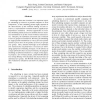Free Online Productivity Tools
i2Speak
i2Symbol
i2OCR
iTex2Img
iWeb2Print
iWeb2Shot
i2Type
iPdf2Split
iPdf2Merge
i2Bopomofo
i2Arabic
i2Style
i2Image
i2PDF
iLatex2Rtf
Sci2ools
103
click to vote
CCGRID
2005
IEEE
2005
IEEE
User group-based workload analysis and modelling
Knowledge about the workload is an important aspect for scheduling of resources as parallel computers or Grid components. As the scheduling quality highly depends on the characteristics of the workload running on such resources, a representative workload model is significant for performance evaluation. Previous approaches on workload modelling mainly focused on methods that use statistical distributions to fit the overall workload characteristics. Therefore, the individual association and correlation to users or groups are usually lost. However, job scheduling for single parallel installations as well as for Grid systems started to focus more on the quality of service for specific user groups. Here, detailed knowledge of the individual user characteristic and preference is necessary for developing appropriate scheduling strategies. In the absence of a large information base of actual workloads, the adequate modelling of submission behaviors is sought. In this paper, we propose a ne...
Related Content
| Added | 24 Jun 2010 |
| Updated | 24 Jun 2010 |
| Type | Conference |
| Year | 2005 |
| Where | CCGRID |
| Authors | Baiyi Song, Carsten Ernemann, Ramin Yahyapour |
Comments (0)

